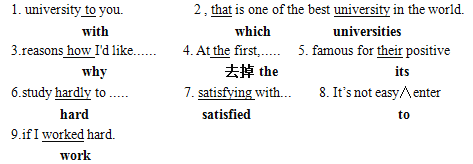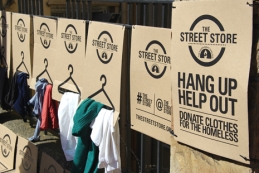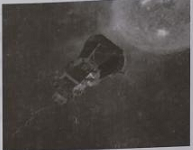��Ŀ����
����Ŀ���ٶ�Ӣ�������ʦҪ��ͬ��֮�佻�������ģ���������ͬ��д���������ġ����й���10�����Դ���ÿ���������������ÿ��������漰һ�����ʵ����ӡ�ɾ�����ġ�
���ӣ���ȱ�ʴ���һ��©�ַ���(��)������������д���üӵĴʡ�
ɾ�����Ѷ���Ĵ���б��(\)������
�ģ��ڴ��Ĵ��»�һ���ߣ����ڸô�����д���ĺ�Ĵʡ�
ע�⣺1.ÿ���������ľ���һ��;
2. ֻ������10��������(�ӵ�11����)���Ʒ֡�
Dear Tom,
It's my honor to share my dream university to you. I'm glad to tell you that my dream university is Peking University, that is one of the best university in the world.
There are several reasons how I'd like Peking University. At the first, it has first-class teaching staff and equipment, which will help me make progress quickly. Secondly, it is famous for their positive academic atmosphere where students study hardly to meet new challenges. And at last, my brother, who studies there, says he is very satisfying with the university.
It��s not easy enter Peking University, but I think my dream will come true if I worked hard.
Could you tell me something about your dream university?
Yours,
Li Hua
���𰸡�
��������������һƪ�����ġ���Ҫ�������ߵ�������ȥ������ѧ���顣
��һ��������̶��÷���share sth. with sb.��ij�˷���ij��ǹ̶��÷�������to�ij�with��
�ڶ���������������Զ���Ӿ���which is one of the best university in the world.���������Peking University�����ж��Ÿ���������which is one of the best university in the world.��һ���������Զ���Ӿ䣬��ϵ���ڴӾ��������ָ�������which��that���������������Զ���Ӿ䣬that�ij�which��
������������̶��ṹ��One of + �������ʸ�����������֮һ���ǹ̶��ṹ������university�ij�universities��
���Ĵ�������̶����͡�That's the reason why�������������ԭ���ǹ̶����ͣ�����how�ij�why��
���崦������̶����at first���ȣ����ȣ��ǹ̶��������ȥ��the��
��������������ʡ�����Ϊ��������ѧ����Χ����������ʾ�����ġ�������their�ij�its��
���ߴ������鸱�ʡ������ѧ����Ŭ��ѧϰ��ӭ���µ���ս��hardŬ������hardly������������hardly�ij�hard��
�ڰ˴�������̶��÷���be satisfied with�����е����⣬�ǹ̶��÷�������satisfying�ij�satisfied��
�ھŴ������鲻��ʽ��It����ʽ�������IJ���ʽ���������������easy���to��
��ʮ��������if����������״��Ӿ���if����������״��Ӿ䣬��������һ�㽫��ʱ���Ӿ���һ������ʱ������worked �ij�work��






